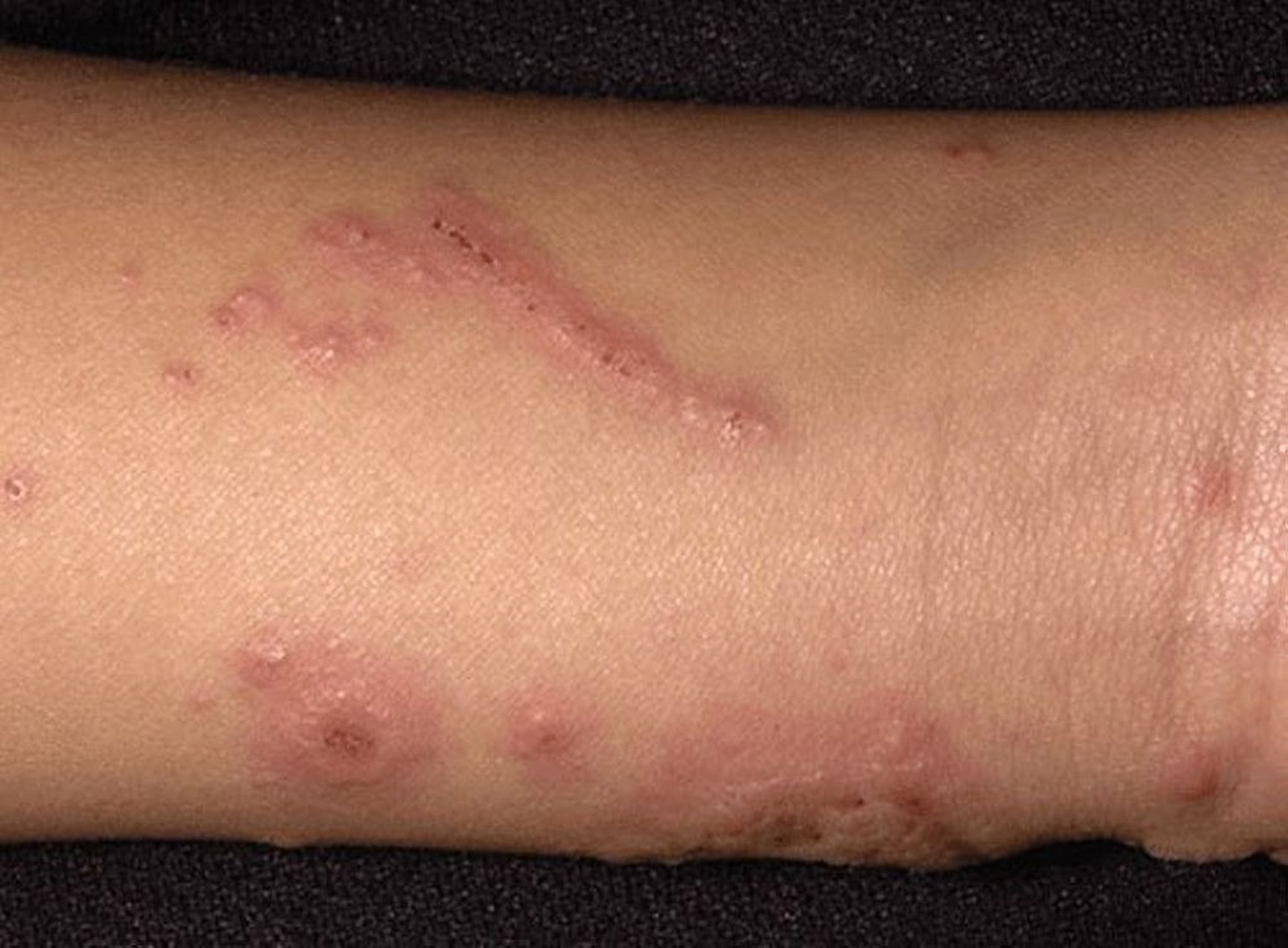Topic Resources
What is contact dermatitis?
Dermatitis is a general term for common skin irritation and inflammation.
Image provided by Thomas Habif, MD.
Contact dermatitis is a rash caused by touching something that causes a reaction in your skin. The substance can irritate your skin (irritant contact dermatitis) or cause an allergic reaction (allergic contact dermatitis).
Thousands of substances can cause irritant contact dermatitis or allergic contact dermatitis
Contact dermatitis can start at any time in your life
If you get contact dermatitis from a certain thing once, you'll probably always get it when you touch that thing
The best way to treat contact dermatitis is to avoid whatever is causing it
Contact dermatitis can take up to 3 weeks to go away
Touching the rash won’t spread it to another person
What causes contact dermatitis?
Irritant contact dermatitis is caused by substances that irritate your skin when you touch them, such as:
Chemicals, such as drain cleaners and nail polish remover
Certain cosmetics, deodorants, and soaps
Rubbing alcohol
Strong solvents and bleach
Certain plants, such as poinsettias and peppers
Sometimes body fluids, such as urine and saliva
Some people are more sensitive than others to irritants.
Allergic contact dermatitis is when your body’s immune system reacts to a substance that touches your skin. You can become allergic to many different things, but the most common causes of allergic contact dermatitis are:
Certain plants, such as poison ivy
Rubber, including latex
Antibiotics and other medicines put on the skin
Perfumes and colognes
Preservatives in food
Some metals, such as nickel and cobalt
Sometimes you get contact dermatitis when sunlight shines on skin that has certain things on it, such as:
Sunscreens
Aftershave lotions
Certain perfumes
Certain antibiotics that you put on your skin
Coal tarCoal tar
Oils
Plants
Certain sprays such as insecticides
What are the symptoms of contact dermatitis?
Symptoms include:
Itching and sometimes burning or pain
Red rash, sometimes with bumps or tiny blisters
Dry, scaly, or cracked skin if you have had contact dermatitis a long time
More redness, weeping, and swelling if the skin gets infected
How can doctors tell if I have contact dermatitis?
Doctors can usually tell that you have contact dermatitis by looking at your rash. However, it can be hard to tell exactly what substance caused the reaction.
If you don’t know the cause of your rash, your doctor may do tests to find out what caused it. These may include patch tests. In patch tests, your doctor puts small amounts of different substances on your skin to see if they cause contact dermatitis.
How do doctors treat contact dermatitis?
Doctors first treat contact dermatitis by making sure you don’t have more contact with the substance that caused the rash. Once the substance is gone, the rash goes away on its own.
The itching and blisters can be relieved with:
Corticosteroid creams
Antihistamine pills
Putting a cloth dipped in cool water or aluminum acetate (Burow solution) on the rash several times a day Putting a cloth dipped in cool water or aluminum acetate (Burow solution) on the rash several times a day
Cool baths with added colloidal oatmeal (a product made of finely ground oatmeal)
Antibiotics, if the skin becomes infected
Oral corticosteroids and medicines that slow down your immune system if the contact dermatitis is severe
Antihistamine pills can make you sleepy, particularly if you're older. Be careful about using them if you have to drive or use power tools. On the other hand, antihistamines may help you sleep at night.
There are several creams for itching that you can buy without a prescription. Antihistamine creams and skin-numbing creams that contain benzocaine sometimes cause a skin reaction, so doctors usually don't want you to use those.There are several creams for itching that you can buy without a prescription. Antihistamine creams and skin-numbing creams that contain benzocaine sometimes cause a skin reaction, so doctors usually don't want you to use those.
How can I prevent contact dermatitis?
Avoid contact with the substances that irritate your skin or give you an allergic reaction.
If you do come in contact, wash your skin with soap and water right away. If you have to touch the substance, wear gloves, clothes, or barrier creams that keep it from touching your skin.


